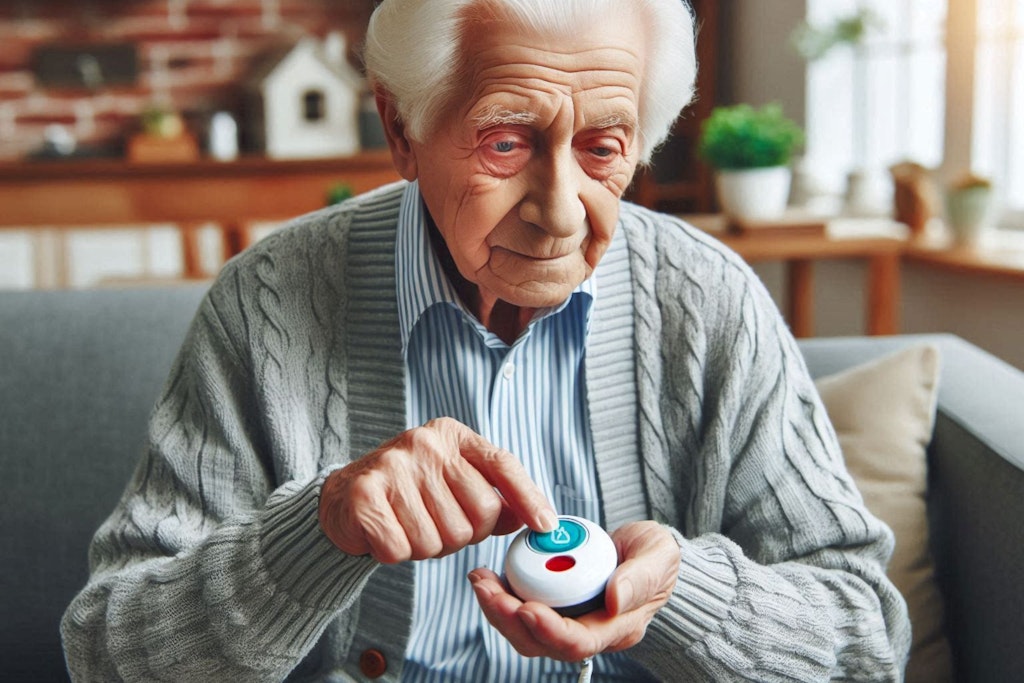AI in aged care: A forward-looking perspective
Last updated on 24 June 2024

The conversation around AI in aged care continues to evolve. The opportunity it presents in Australia against a backdrop of workforce challenges and an ageing population is immense. Industry leaders face the challenge of optimising operations with the right mix of artificial and human intelligence oversight.
Here, we review discussions around what will arguably be one of the most significant technological changes our industry has seen, with David Waldie, Eevi Life Managing Director, exploring how AI can influence a seemingly simple tool: nurse call systems.
How can AI be integrated into nurse call systems to improve response times and efficiency in aged care homes?
By predicting peak call times, optimising staff allocation, filtering and prioritising alerts, bringing knowledge of resident conditions and routines, and assisting decision-making, AI promises a significant improvement to existing response times and efficiency.
Voice-activated systems and sentiment analysis using natural language processing (NLP) allow residents to communicate their needs clearly. Sensors provide situational awareness of the room. Machine learning algorithms analyse this data with data on conditions, routines, rosters, availability, and past calls to streamline operations, ensuring faster response times.
AI can provide real-time awareness, assisted decision-making, and automated task assignments, helping caregivers manage their workload more effectively and improving overall response efficiency.
What specific AI technologies are most effective for enhancing nurse call systems in aged care settings?
We see machine learning, natural language processing (NLP), computer vision, predictive analytics, and AI chatbots all having a role. Machine learning helps predict volumes and optimise staffing. NLP improves voice recognition for better resident communication.
Computer vision monitors residents to detect falls or unusual behaviour. Predictive analytics identify patterns indicating health deterioration. AI chatbots manage non-critical requests, providing timely assistance and ensuring residents feel heard, even during busy periods.
How does AI contribute to personalised care and better resident outcomes?
Simply put, better care decisions, faster responses, and more automation, resulting in more time with carers. AI learns individual preferences, health conditions, and behaviour patterns to provide more relevant assistance. Predictive analytics can detect early signs of health issues, allowing for timely interventions that improve outcomes.
AI systems continuously adapt based on interactions and outcomes, ensuring increasingly personalised care. This leads to higher resident satisfaction and better health outcomes by addressing specific needs and preventing issues before they become critical.
What are some examples of AI-powered features or functionalities that can assist caregivers in aged care homes?
Replace the traditional call bell with AI power, to understand the resident’s need as if a carer were in the room. NLP-enabled voice recognition, fall detection using computer vision, sensor data with predictive health monitoring, and behavioural analysis offer this prospect.
Move beyond traditional call prioritisation, to intelligent triage and routing, applying ML with situational awareness to the array of inputs like carer rosters and availability, resident conditions and routines and historical data to assist decision-making.
Overlay this with the ability of predictive health monitoring to identify potential issues early, prompting scheduled look-ins. Automate reporting and behavioural analysis to provide insights for care planners to make continuous improvements to the care plan.
What are the key considerations or challenges when implementing AI in nurse call systems for aged care?
It is a long list, but it includes achieving interoperability with existing systems, addressing ethical concerns, training staff, and obtaining resident consent. Data privacy must comply with regulations like GDPR, and robust encryption is essential for security. Systems need to integrate seamlessly with existing infrastructure.
Ethical concerns include AI decision-making and care prioritisation. Staff training is crucial for effective use, and resident consent is necessary for data collection and AI utilisation, balancing innovation with respect for resident rights.
Can AI-powered nurse call systems help predict and prevent emergencies or health deterioration?
AI-powered nurse call systems promise to predict and prevent emergencies by continuously analysing data from sensors and health records. Predictive analytics identify patterns and trends indicating potential health issues, enabling early interventions.
For example, AI can detect subtle changes in mobility, vital signs, or behaviour that are early indicators of falls or medical crises, alerting caregivers to take preventive action. This proactive approach promises to help prevent emergencies, enhance resident safety, and improve health outcomes by addressing issues before they escalate.
What future advancements do you foresee in AI and nurse call systems for aged care?
You would be brave to predict how AI will impact aged care. However, future advancements in AI and nurse call systems may include advanced predictive analytics for more accurate health deterioration predictions, integration with wearable technology for real-time health monitoring, and augmented reality (AR) tools to assist caregivers. Sophisticated AI assistants could handle a broader range of resident needs autonomously, with AI-assisted care planning and decision-making.
How do we ensure AI delivers on the social good it promises in care?
Human interaction is at the centre of care. That is not going to change. Interestingly, one study on the impact of monitoring technologies in elder care observed that an important benefit was the increased communications from care providers.
The study reported that calls and conversations as part of the study broke up isolation and were appreciated at a deeper level than just for care delivery. That is, technology is no good without the care conversation. The same goes for AI in nurse calls. We would see AI freeing up carers to spend more time with residents, delivering the right care to a resident at the right time and enabling better care planning for future needs.